What’s going on at QPR? Some answers to key questions being asked
These are worrying times for QPR fans and judging by the reaction on social media, there’s a general feeling that questions are being left unanswered. So here’s an attempt to answer some of them.
Is Harry Redknapp’s position under threat?
Redknapp has a decent relationship with Tony Fernandes, who is loathe to sack managers.
There were tensions last season and Redknapp has rattled a few cages among the Rangers hierarchy – for example over the signing of Yossi Benayoun.
However, Fernandes, as chairman and the public face of the club’s owners, wants to be seen to give him more time. The pair spoke at length on Saturday, 24 hours before the defeat at West Ham, and since that result Redknapp’s position appears unchanged.
Tim Sherwood has been discussed as a possible replacement though.
What about his new contract?
After it was initially suggested that Redknapp’s position was under threat, it was then widely reported that he had been offered a two-year contract and was set to sign.
Redknapp was in fact approached during the summer about signing a one-year extension. That is now no longer being discussed, obviously in light of QPR’s start to the campaign. His current contract expires at the end of the season.
Redknapp talks about the players not being fit. Surely he’s responsible for this?
What Redknapp is largely referring to here is the club being arguably slow to sign new players during the summer (remember that, more often than not, managers don’t negotiate transfers themselves), consequently forcing him to take possible risks further down the line on players who haven’t had much time to bed in and are perhaps not where he’d like them to be fitness-wise.
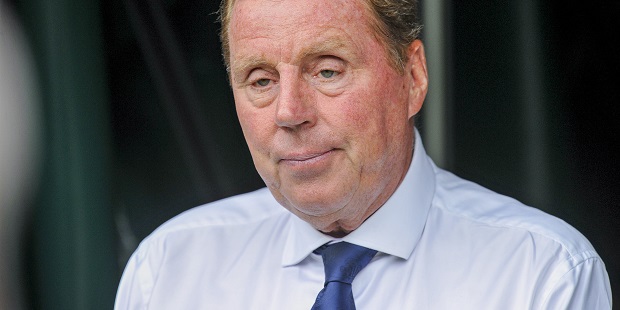
There is some truth in this, although it must be said it’s by no means unusual for clubs and managers to be in that position, such is the nature of the game.
It could also be argued that a clearer and more realistic transfer strategy would have enabled the club to get its business done much more efficiently.
That was also arguably the case when Neil Warnock was manager after promotion in 2011. But his stock among fans was high so his claim that the takeover of that summer affected his transfer dealings has been largely accepted. As a club QPR have been on the back foot in the transfer market since that influx of poor signings.
This summer, Rangers were keen to get some signings done quickly – particularly in midfield, which was identified as a key area. Two immediate targets, Steve Sidwell and Craig Bryson, seemed to them to be sensible and realistic. But Sidwell chose to sign for Stoke and Bryson caused genuine surprise by opting to stay at Derby.
From that point on Rangers were playing catch-up somewhat. Redknapp likes Mohamed Diame, who later joined Hull from West Ham, but the board had misgivings. Other possible options were explored but came to nothing, the Jordon Mutch deal presented itself but he’s been nursing an injury. And Norwich dug in over a fee for Leroy Fer, whose transfer took some time to go through – Redknapp wanted him to join up with the squad much sooner.
In the end, the chance arose to sign Sandro, but he had knee trouble prior to joining from Tottenham. Redknapp was fortunate that Niko Kranjcar, whose improved sharpness has been noticeable, had a decent pre-season with Dynamo Kiev. But overall, the key post-promotion aim of getting the midfield sewn up sooner rather than later wasn’t met and Redknapp can argue this has had a huge knock-on effect.
Redknapp says Rangers’ pre-season was poor. Whose responsibility was that?
For the second summer running, Redknapp was happy to be spared the kind of pre-season jaunt to Asia imposed on his predecessor Mark Hughes, and visits to Germany and Ireland were duly agreed. As is standard procedure, discussions took place with a number of clubs and the manager ultimately approved the choice of opponents. Redknapp has since described the pre-season trip to Germany, where Rangers played two matches and stayed for a week, in extremely negative terms.

In Germany, some of the players were unhappy with their rooms and some of them were privately expressing concern at the club’s lack of transfer activity, especially with regard to a strike partner for Charlie Austin. But the facilities were generally good, the setting was superb, and on most days they trained twice. They also used a games room and other areas of their hotel which were converted for them at Redknapp’s request.
During a subsequent visit to Ireland, the squad stayed at a place previously used by Tottenham when Redknapp was their manager. It has also been used by Real Madrid and Barcelona. But Rangers’ opponents during the visit, Shamrock Rovers and Athlone Town, were certainly well below the standard Redknapp would have chosen to be facing at that stage of pre-season. It’s fair to say he wasn’t overjoyed about the trip.
It’s worth remembering that two years earlier the squad travelled long distances between matches and were treated like pop stars during their tour – something Hughes and his backroom team were unhappy about and feared would affect the team’s focus and ultimately their start to the season. So Redknapp in many ways had a much more favourable pre-season.
It’s also worth remembering that successive QPR managers have at best been unhappy and at worst been totally stitched up by the club’s pre-season organisation. While Hughes and maybe Redknapp had reasons to be unhappy, as far back as 2006 Gary Waddock endured a disastrous trip to Italy and was soon sacked after his half-fit side made a terrible start to the campaign.
So if Rangers as a club are at fault when it comes to organising pre-seasons, it’s an issue that goes back years.
Has Redknapp lost the dressing room?
There are some players who don’t like him or his management style, but that’s typical of the situation at most clubs and was as much the case at the end of last season, when Redknapp was a relative hero, as it is now. Key players are on his side, or at least not against him, and he has a proven record of having good relationships with his players, as shown by how many have been happy to play for him at different clubs.
Why didn’t QPR have a replacement for Loic Remy lined up? Surely they knew he’d probably leave?
Despite Remy’s release clause and from the outside it seeming probable he would move, Rangers, perhaps foolishly, genuinely believed he would stay. There are a few main reasons for this.
First, and probably most important, they believed Remy had an excellent and honest relationship with Fernandes and wouldn’t want to let him down.
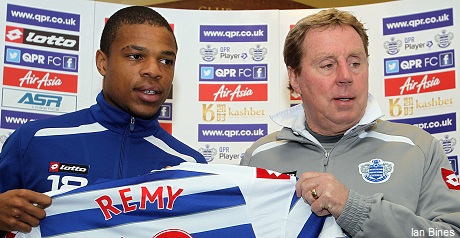
Also, Remy had indicated that he would stay; Fernandes’ recent tweets about the player agreeing to sign a new contract are accurate, to a point – it was on the understanding that a top-four club wouldn’t come in for him.
There had long been a reluctance among top English clubs to sign him. He joined Rangers in the first place in the hope this would change, later that year he was loaned to Newcastle after bigger clubs shunned him, and despite numerous reports of interest from the likes of Chelsea, Arsenal and Tottenham, there was nothing concrete until Liverpool approached.
Furthermore, by his actions Remy convinced Rangers that he was as good as his word. He always maintained he’d only leave for the Champions League and held true to that. He didn’t talk QPR down in any way and his attitude and focus after returning to training following the collapse of his Liverpool move was seen as excellent. He was asked by Fernandes to try to resolve his future sooner rather than later in order to avoid leaving Rangers in the lurch and he did so, quickly agreeing to join Liverpool before they pulled out of the deal.
So, with his agent indicating very strongly in the hours before Chelsea and then Arsenal eventually made approaches that Remy saw his future as being at QPR, the club were increasingly confident that he would stay.
As for a replacement, just as it was seeming likely that Remy would in fact go, it began to seem increasingly likely that Rangers would be able to do a deal with Toronto FC to sign Jermain Defoe. But in the end the Canadian club were unwilling to release him and he is now expected to move to west London in January.
QPR say they were interested in Liverpool’s Fabio Borini and suggested his wage demands were excessive. Earlier during the transfer window they targeted Ajax’s Kolbeinn Sigthorsson but neither party ever seemed convinced, while Watford wanted £10m for Troy Deeney.
Why was Danny Simpson sold?
Simpson always seemed likely to be the player most adversely affected by Redknapp’s planned switch to a 3-5-2 formation. This was underlined in Germany, where he was unconvincing as a wing-back during practice matches when the new system was being worked on. Maurico Isla was later signed.
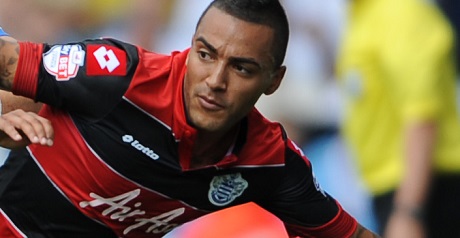
Simpson was on Championship wages – albeit QPR’s version of Championship wages – and there were no plans to give him an improved contract. He was offered lucrative terms by Leicester and with Rangers happy with the deal – potentially worth £2m – it was felt it was best for all parties that he moved on.
What does Glenn Hoddle do?
It’s a misconception that Hoddle was brought in to coach the 3-5-2 formation. That stemmed from speculation based on the fact that he has used it previously – as has Redknapp.
Hoddle is not as involved as Steve McClaren was, but the latter was given the hugely important role of taking pre-season training while Redknapp was recovering after a knee operation. And McClaren, although brought in on a short-term basis, worked full-time. Hoddle works part-time.
As a part-time coach Hoddle’s role is limited, he just happens to be a big name so has been the focus of much attention. He has done some work with the players, including Armand Traore, whose recent tendency to tuck in from left-back to cover his centre-backs is something the pair have been working on.
Hoddle also observes from the stands and gives his observations from there, as did McClaren and Wally Downes before him.
Could QPR be relegated to the Conference?
If Rangers are relegated from the Premier League, unsuccessfully challenge a fine handed out for breaching Financial Fair Play rules and refuse to pay it, they could, in theory, be thrown out of the Football League and by definition end up in the Conference. But they or any other club could in theory be thrown out of the League for not paying a fine or for failing to abide by any number of the League’s rules. If you defy a governing body you’re likely to be expelled.
If QPR are relegated back to the League, fined, and the punishment stands, they’re unlikely to be allowed to stay in the League if they don’t pay up. So in that hypothetical scenario the likely outcome is simple: they’ll pay up.
What’s going on with Cargiant and the plans for a new stadium at Old Oak?
There seems to be some confusion about this issue, with many believing Cargiant, which owns 45 acres of the proposed site of the Old Oak regeneration, are blocking or opposing QPR’s move there in some way. There have been reports of the club’s plans being scuppered or dealt huge setbacks, Cargiant refusing to budge and so on. There has also been pure speculation about potential compulsory purchase orders and the like.
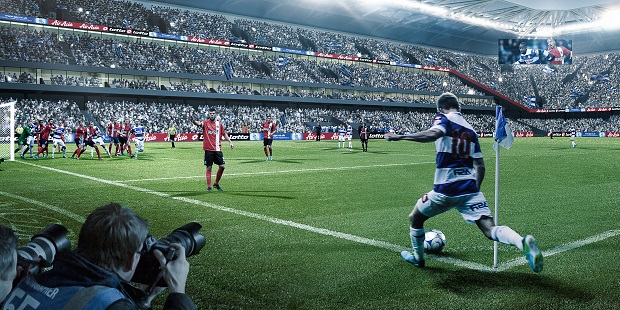
All parties accept that a regeneration of Old Oak is likely to happen. There is no question of Cargiant refusing to play ball. Cargiant have for some time been looking for an alternative site for their current sales operation but once that relocates they would still own the land and be in a position to develop their own plans for its regeneration – without their current car supermarket on the site. There were discussions with QPR but with no deal in place the two parties have gone their separate ways.
The Cargiant brand in a sense is misleading in that it perhaps conjures up images of second-hand car salesmen and from that it’s easy to draw incorrect conclusions about how easily this kind of operation could be swept aside by people of the status and wealth of QPR’s owners.
The owner of Cargiant owns land on the would-be Old Oak site beyond the car supermarket itself and that owner is not, as some appear to believe, Tony Mendes, the managing director whose name has been prominent of late and who, despite being a fanatical QPR fan, could find himself cast as the villain of the piece.
The owner is Geoffrey Warren, who has an estimated fortune of £220m and is a major player on the London property scene.
But this isn’t really a Cargiant v QPR issue. Others are also fully entitled to submit plans and would also have to meet the criteria set in terms of the provision of jobs and homes – which ultimately is what applications will be assessed on.
As an existing land owner, Cargiant are in a strong position. But, if the club’s plans stand up to scrutiny and make financial sense, so too are QPR as a pillar of the local community with the all-important public-interest factor potentially hugely weighted in their favour because thousands of their fans support the plans for a new stadium.
The issue is likely to boil down to finances; who can provide the necessary jobs and homes most economically.
Rangers had a lot of the early momentum because they went public, have high-profile owners and support from the Greater London Authority and other relevant bodies. The key issue is who has that kind of backing further down the line as government money is perhaps sought to help fund the project. That, in the end, is what matters most.
QPR intend to submit a planning application in April 2015.
What’s happening with Warren Farm?
Fernandes recently cast doubt over whether QPR would go ahead with a new training ground at Warren Farm, suggesting the club’s initial plans were perhaps unnecessarily grand and that taking the option to extend their current base at Harlington would be sufficient and more cost effective.
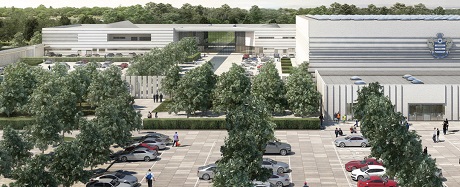
After criticism from fans, and following recent discussions with Ealing Council, the project is now likely to go ahead but will be somewhat more modest and less costly than initially planned.
Rather than a new facility on a par with the likes of Southampton’s, which was seen as a benchmark, Warren Farm is now on course to be more comparable to a training ground recently opened by Brighton. This should still enable Rangers’ academy to obtain Category One status.
Follow West London Sport on Twitter
Find us on Facebook

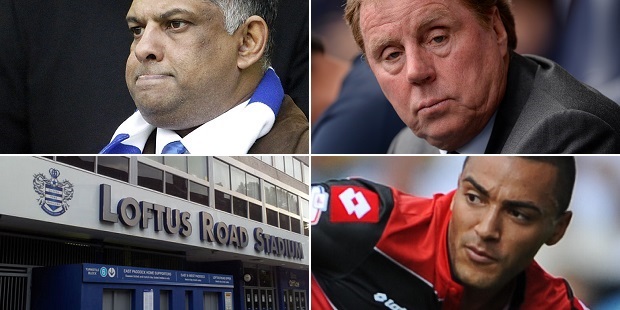
11/10/2014 @ 2:31 am
Thanks for the PR statement QPR, now how about an impartial assessment of what’s going on at our club.